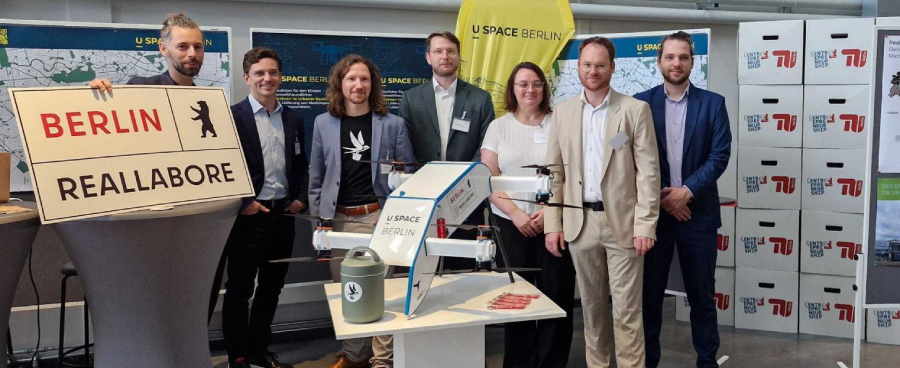U-Space Berlin Takes Flight -Pioneering Urban Drone Deliveries for a Sustainable Future

Finally, after months of conceptualizing, planning, and collaboration, today marks a milestone in urban aviation: the launch of the three-year U-Space Berlin testbed. The project, aimed at integrating drones into Berlin’s urban airspace, was inaugurated by none other than Berlin’s Senator Franziska Giffey, who joined the partners and supporters to celebrate this new chapter in aerospace innovation.
U-Space Berlin is designed to demonstrate the safe, efficient, and environmentally friendly use of drones for delivering medical goods and healthy food in urban areas. The initiative represents a major step toward reimagining city logistics and leveraging aerial mobility to meet the challenges of modern urban life. The project’s goal is not only to showcase technological capabilities but also to establish regulatory frameworks, operational protocols, and public trust in urban drone services.
The vision behind U-Space Berlin is both ambitious and deeply rooted in the city’s rich aerospace heritage. Berlin has long been a cradle of innovation in aviation, from Otto Lilienthal’s early glider experiments to the many pioneers who have shaped flight technology over the decades. Today, Berlin is poised to continue this legacy by becoming a hub for urban drone operations, setting benchmarks for cities worldwide.
The testbed will enable drones to operate in real urban conditions, navigating the complexities of dense infrastructure, varying weather patterns, and stringent safety requirements. By focusing on medical deliveries and nutritious food logistics, the initiative addresses two critical societal needs: rapid access to healthcare supplies and support for sustainable, local food distribution. These applications demonstrate how drones can offer tangible benefits to citizens, beyond technological fascination.
Collaboration is at the heart of U-Space Berlin. The project brings together a diverse network of partners from startups to academic institutions and government bodies. Key contributors include Startup Colors, Labfly, marktschwalbe GmbH, Murzilli Consulting, Technische Universität Berlin, Akkon Hochschule für Humanwissenschaften, Berlin Partner für Wirtschaft und Technologie GmbH, and The Drivery. This mix of expertise—from technological development to urban planning, logistics, and human factors—ensures a holistic approach to the challenges of urban drone integration.
The project team comprises a dedicated and passionate group of professionals: Tim Fischer, Tobias B., Dr. Robin Kellermann, Klaus Tenning, Maren Lesche, Sanja Turudija, Richard Boden, Janot Lubritz, Marielies Becker, and Denny Paulicke. Their combined experience and commitment to innovation are instrumental in driving the testbed forward, setting the stage for what promises to be a transformative era in urban mobility.
Safety and sustainability are central pillars of the U-Space Berlin initiative. By leveraging electric drones, the project aims to reduce CO2 emissions while maintaining speed and reliability in deliveries. Real-time monitoring, automated traffic management, and advanced flight control systems are employed to guarantee operational safety. Furthermore, the project emphasizes public engagement, ensuring that Berliners are informed and confident in the use of drones in their neighborhoods.
The testbed also serves as a living laboratory for regulatory experimentation. Urban airspace management is still in its infancy, and projects like U-Space Berlin provide invaluable data for policymakers, city planners, and aviation authorities. The insights gained here will inform future regulations, enabling cities worldwide to implement drone-based services responsibly and efficiently.
As U-Space Berlin takes flight, it represents more than just a technological experiment—it is a vision for a sustainable, connected, and responsive urban future. By demonstrating that drones can operate safely and effectively in complex city environments, the project paves the way for a new chapter in aerospace history. Berlin, a city synonymous with innovation and pioneering spirit, is now leading the way in urban aerial mobility, proving that the sky is not the limit but the beginning of a new frontier.
With the support of the Senate departments for Economy, Energy, and Business as well as Mobility, Transport, Climate Protection, and the Environment, U-Space Berlin stands poised to redefine what is possible in urban logistics. The next three years promise exciting developments, groundbreaking research, and, most importantly, practical solutions that improve daily life for Berliners.
The journey begins today, and the city—and the skies above it—will never be the same.

.png)


